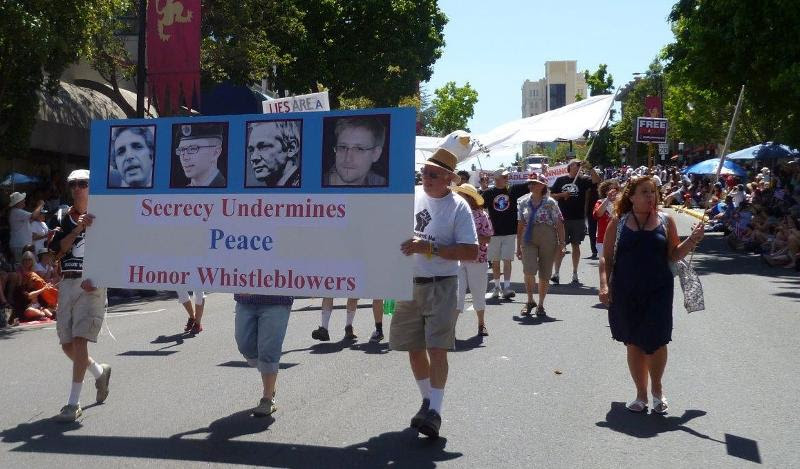Peace House marching in 4th of July Parade 2013, honoring whistleblowers Ellisberg, Manning, Assange, and Snowden
WikiLeaks Cables Shed Needed Light on Current U.S. Foreign Policy Failures – Huntington Post
“Consider Syria, which is dominating the international news because of increased Russian military intervention as well as a surge of some 500,000 refugees from the region arriving in Europe. Why has it taken so long for Washington to even begin — yes, it is unfortunately just beginning — to reconsider the policy of requiring Syrian President Bashar al-Assad to agree to resign before any meaningful negotiations can take place? After all, any diplomat could have told the White House that demanding the political suicide of one party to a civil war as a condition for negotiations is not how civil wars end. Practically speaking, this policy has been a commitment to indefinite warfare.
The answer can be found in diplomatic communications released by WikiLeaks, which show that regime change has been the policy of the U.S. government as far back as 2006. Even more horrifying — after hundreds of thousands of deaths, untold lives ruined and four million people displaced — is the evidence that Washington has had a policy of promoting sectarian warfare in Syria for the purpose of destabilizing the Assad government. A cable from the top U.S. embassy official (the chargé d’affaires) in Damascus in December 2006 offers suggestions for how Washington could exacerbate and take advantage of certain “vulnerabilities” of the government of Syria. Vulnerabilities to be exploited include “the presence of transiting Islamist extremists” and “Sunni fears of Iranian influence.”
The cables also show how Honduras, under the government of President Manuel Zelaya, became an enemy state for becoming too friendly with other left governments.
“Cables from U.S. diplomats in Latin America shed a lot of light on U.S. policy in that region as well. They show a consistent pattern of not only hostility but action against left-wing governments, including those of Bolivia, Ecuador, Honduras, Venezuela and others. The cables see Venezuela as so influential that it is almost as if they are talking about a new Soviet Union that must be contained. A five-point plan to counter the political success of Venezuela’s President Hugo Chávez (who died of cancer in 2013), outlined in a 2006 cable by William Brownfield, the U.S. ambassador to the country at the time, includes “penetrating Chavismo’s political base,” “dividing Chavismo” and “isolating Chavez internationally.” Other memos provide more details of how this was attempted. For example, U.S. pressure was brought to bear on countries as small and needy as Haiti, Honduras and Jamaica to reject energy assistance from Venezuela that would save them hundreds of millions of dollars.”
WikiLeaks Reveals How the US Aggressively Pursued Regime Change in Syria, Igniting a Bloodbath
The New Facade for Regime Change: a Brief History of Humanitarian Interventionism
Call for a National Debate on U.S. Regime Change Policy – by Center for Citizen Initiatives June 24, 2016 “On June 16, the New York Times reported : “More than 50 State Department diplomats have signed an internal memo sharply critical of the Obama administration’s policy in Syria, urging the United States to carry out military strikes against the government of President Bashar al-Assad to stop its persistent violations of a cease-fire in the country’s five-year-old civil war. The memo, a draft of which was provided to The New York Times by a State Department official, says American policy has been “overwhelmed” by the unrelenting violence in Syria. It calls for “a judicious use of stand-off and air weapons, which would undergird and drive a more focused and hard-nosed U.S.-led diplomatic process.”



